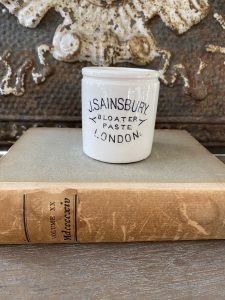
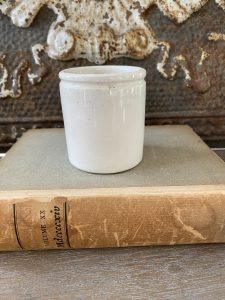
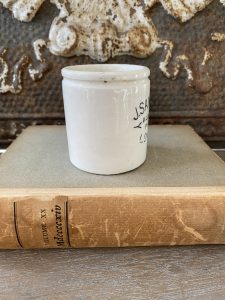
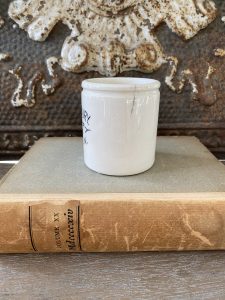
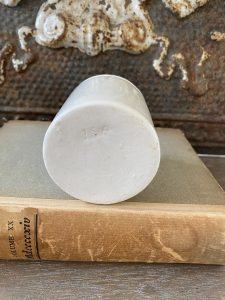
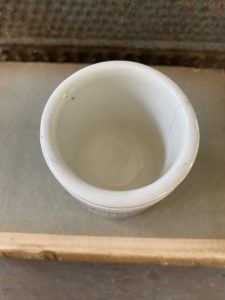
Shown below with several different varieties of the Sainsbury Bloater Paste Labels over the years from my personal collection….

Measures approximately 2 ½” tall x 2″ diameter
This is a listing for one (1) RARE J. Sainsbury Bloater Paste Advertising Pot c. 1880’s. This sweet mini pot is in excellent condition with only a couple of tiny flea bits and beautiful overall crazing. A Very Rare Find!

Pot Reads:
Each of these charming pots vary slightly in shape and size as they were each handmade. Looks darling loaded with toothpicks or a single stem or displayed with your other favorite antique advertising pieces. Please consider the images as your best description for all of my items.
I offer substantial savings in shipping costs when multiple items are combined into one package. I will credit any overpayment of postage charged to you after finding the best shipping option.
A little bit of Sainsbury’s 150-year History:
Sainsbury’s was off to a romantic but practical start in 1869 when two young employees of neighboring London shops met, married, and started a small dairy store in their three-story Drury Lane home. Mary Ann Staples, 19, had grown up in her father’s dairy business. John James Sainsbury, 25, had worked for a hardware merchant and grocer. Their shop was a success from the start, as both John and Mary Ann had the business knowledge and capacity for hard work that it took to win the loyalty of the local trade. Their passion for order, cleanliness, and high-quality merchandise made the shop an inviting place, in contrast to the prevalent clutter of many tiny family-owned shops and the insanitary conditions of the street vendors’ stalls and carts.
Seven years later the Sainsbury’s opened a second shop in a newly developed section of town and moved into the upper portion of the building. Within a few years, they had opened several similar branches, planning to have a shop for each of their sons to manage when he grew up. By the time their six sons were adults, the branches far outnumbered them. Yet caution has always been characteristic of Sainsbury expansion; they regularly passed up opportunities to buy groups or chains of stores, preferring to develop each new store independently.
The passion for high quality led them to a turning point in 1882, when they opened a branch in Croydon. They used advanced design and materials that had an elegance not attempted in the other shops and made the store easy to keep clean. The walls, floor, and counter fronts were tiled, the countertops were marble slabs. Customers were seated on bentwood chairs. The store’s cleanliness–still a rarity in food shops of that time–and elaborate decor helped attract more prosperous customers; it was an instant success. Several similar shops were added during that decade, while Sainsbury’s also developed a less elaborate design for suburban branches opened during those years. In these, business could be done through open windows, as in the common market areas, but the design also attracted customers to come into the store to see a greater variety of food.
In 1891, Sainsbury’s moved its headquarters to Blackfriars, where it remained throughout the 20th century. The location provided easy access to wholesale markets and transportation. To obtain the best quality in food, Sainsbury’s always kept in close touch with suppliers, and it controlled and distributed stock from a central depot until the 1960s.
| Weight | 1.0 lbs |
|---|---|
| Dimensions | 9 × 6 × 6 in |
Only logged in customers who have purchased this product may leave a review.

There are no reviews yet.